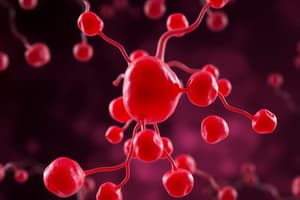Podcast
Questions and Answers
What is the primary function of red blood cells (RBCs)?
What is the primary function of red blood cells (RBCs)?
- Transport oxygen from lungs to tissues (correct)
- Produce hormones
- Fight infections
- Transport nutrients to cells
What cellular component do mature red blood cells lack?
What cellular component do mature red blood cells lack?
- Cell membrane
- Ribosomes
- Nucleus (correct)
- Cytoplasm
How many ATP molecules are produced during glycolysis in red blood cells?
How many ATP molecules are produced during glycolysis in red blood cells?
- 1 ATP
- 3 ATP
- 2 ATP (correct)
- 4 ATP
What is the role of NADPH in red blood cells?
What is the role of NADPH in red blood cells?
Which of the following statements regarding the structure of red blood cells is true?
Which of the following statements regarding the structure of red blood cells is true?
What type of transport do GLUT proteins utilize to move glucose across the plasma membrane?
What type of transport do GLUT proteins utilize to move glucose across the plasma membrane?
Which of the following statements about anaerobic glycolysis is true?
Which of the following statements about anaerobic glycolysis is true?
What is the net energy yield in ATP from the anaerobic glycolysis of one glucose molecule?
What is the net energy yield in ATP from the anaerobic glycolysis of one glucose molecule?
Which molecule is produced as a product of glycolysis that can be sent to the liver via the Cori cycle?
Which molecule is produced as a product of glycolysis that can be sent to the liver via the Cori cycle?
What happens to GLUT proteins upon glucose binding?
What happens to GLUT proteins upon glucose binding?
How many NADH molecules are generated for each glucose during anaerobic glycolysis?
How many NADH molecules are generated for each glucose during anaerobic glycolysis?
Which of the following best describes the process of facilitated diffusion utilized by GLUT 1?
Which of the following best describes the process of facilitated diffusion utilized by GLUT 1?
What is the primary function of lactate during anaerobic glycolysis?
What is the primary function of lactate during anaerobic glycolysis?
What is one of the main causes of acquired methemoglobinemia?
What is one of the main causes of acquired methemoglobinemia?
Which agent is used in the treatment of methemoglobinemia?
Which agent is used in the treatment of methemoglobinemia?
What condition is characterized by an inability to bind oxygen effectively?
What condition is characterized by an inability to bind oxygen effectively?
What is a potential severe outcome if methemoglobinemia reaches more than 70% metHb?
What is a potential severe outcome if methemoglobinemia reaches more than 70% metHb?
What genetic mutation is associated with congenital methemoglobinemia?
What genetic mutation is associated with congenital methemoglobinemia?
Which population is known for a high incidence of a specific methemoglobinemia disorder?
Which population is known for a high incidence of a specific methemoglobinemia disorder?
What effect does NADH-cytochrome b5 reductase deficiency have on hemoglobin?
What effect does NADH-cytochrome b5 reductase deficiency have on hemoglobin?
Which of the following is NOT a symptom of methemoglobinemia?
Which of the following is NOT a symptom of methemoglobinemia?
What is one of the roles of NADPH in biological systems?
What is one of the roles of NADPH in biological systems?
Which of the following substances does NADPH help neutralize?
Which of the following substances does NADPH help neutralize?
Which enzyme utilizes electrons from NADPH in red blood cells to reduce oxidized glutathione?
Which enzyme utilizes electrons from NADPH in red blood cells to reduce oxidized glutathione?
In addition to biosynthesis, what major function does NADPH serve in the immune response?
In addition to biosynthesis, what major function does NADPH serve in the immune response?
What happens to NADPH levels in the case of G6PD deficiency?
What happens to NADPH levels in the case of G6PD deficiency?
Which biological process is NADPH NOT involved in?
Which biological process is NADPH NOT involved in?
Which reactive oxygen species is not directly neutralized by NADPH?
Which reactive oxygen species is not directly neutralized by NADPH?
What role does NADPH play regarding cytochrome P450 monooxygenase?
What role does NADPH play regarding cytochrome P450 monooxygenase?
What is the primary cause of hemolytic anemia in patients with G6PD deficiency?
What is the primary cause of hemolytic anemia in patients with G6PD deficiency?
Which of the following statements is true regarding the inheritance of G6PD deficiency?
Which of the following statements is true regarding the inheritance of G6PD deficiency?
What characterizes the red blood cells (RBCs) of individuals with G6PD deficiency during oxidative stress?
What characterizes the red blood cells (RBCs) of individuals with G6PD deficiency during oxidative stress?
What percentage of enzyme activity is generally associated with asymptomatic G6PD deficiency?
What percentage of enzyme activity is generally associated with asymptomatic G6PD deficiency?
How many distinct G6PD variants have been identified in the population?
How many distinct G6PD variants have been identified in the population?
What type of mutations are most commonly found in G6PD variants?
What type of mutations are most commonly found in G6PD variants?
What happens to RBCs in G6PD deficiency when oxidative stress occurs?
What happens to RBCs in G6PD deficiency when oxidative stress occurs?
Which factor primarily causes a reduction in NADPH levels in G6PD deficiency?
Which factor primarily causes a reduction in NADPH levels in G6PD deficiency?
Flashcards are hidden until you start studying
Study Notes
Red Blood Cell Metabolism Overview
- Red blood cells (RBCs) lack mitochondria and only use glucose for energy production via glycolysis.
- RBCs have a biconcave disc shape to maximize surface area for gas exchange and are flexible to pass through capillaries.
- RBCs have a short lifespan of approximately 120 days and are constantly replaced.
- RBCs produce only 2 ATP molecules per glucose molecule through glycolysis.
Glycolysis
- Glycolysis, the metabolic pathway used by RBCs, produces ATP, 2,3-bisphosphoglycerate (2,3-BPG), and converts Fe3+ to Fe2+ .
- 2,3-BPG regulates oxygen affinity to hemoglobin.
- Fe2+ is essential for oxygen binding to hemoglobin.
Pentose Phosphate Pathway (PPP)
- The PPP generates NADPH, which is essential for reducing oxidative stress in RBCs.
Glucose Transporters: GLUT1
- RBCs rely on GLUT1 transporters to facilitate glucose uptake.
- GLUT1 transporters are present on the plasma membrane and function through facilitated diffusion, which is ATP-independent.
RBC Energy Metabolism
- Anaerobic glycolysis is the primary source of energy for RBCs.
- Glycolysis yields 2 ATP, 2 NADH, and 2 pyruvate molecules per glucose molecule.
- NAD+ is regenerated by converting pyruvate to lactate.
- Lactate is transported to the liver for the Cori cycle.
Methemoglobinemia
- Methemoglobinemia occurs when iron in hemoglobin is oxidized to Fe3+, which cannot bind oxygen.
- This condition can lead to tissue hypoxia and symptoms like anxiety, headache, and dyspnea.
- Methemoglobinemia can be acquired due to oxidative stress or congenital deficiencies in NADH-cytochrome b5 reductase.
- Treatment for methemoglobinemia involves using methylene blue, a reducing agent, to convert Fe3+ back to Fe2+.
NADPH Biological Roles
- NADPH plays crucial roles in various cellular processes, including biosynthesis of fatty acids, cholesterol, and steroids.
- It neutralizes reactive oxygen species (ROS) like hydrogen peroxide, superoxide, and hydroxyl radical.
- It provides reducing equivalents for cytochrome P450 monooxygenase systems involved in steroid biosynthesis and xenobiotic/drug detoxification.
- It participates in phagocytosis, the destruction of pathogens by macrophages and neutrophils.
- It is a substrate for nitric oxide (NO) synthesis.
NADPH Role in RBC
- NADPH is essential for maintaining the reduced form of glutathione (GSH), a major antioxidant in RBCs.
- G6PD, the enzyme responsible for NADPH production in RBCs, plays a key role in protecting against oxidative stress.
G6PD Deficiency
- G6PD deficiency, an X-linked genetic disorder, results in reduced NADPH production, increasing oxidative stress and Heinz body formation.
- Individuals with G6PD deficiency are typically asymptomatic unless exposed to triggers like infections or certain medications.
- G6PD deficiency causes episodic hemolytic anemia.
G6PD Deficiency Variants and Hemolysis
- There are numerous G6PD variants, with over 200 mutations identified.
- These mutations primarily involve point missense mutations affecting enzyme stability and kinetics.
- Individuals with G6PD activity levels greater than 60% of normal are typically asymptomatic.
Studying That Suits You
Use AI to generate personalized quizzes and flashcards to suit your learning preferences.



